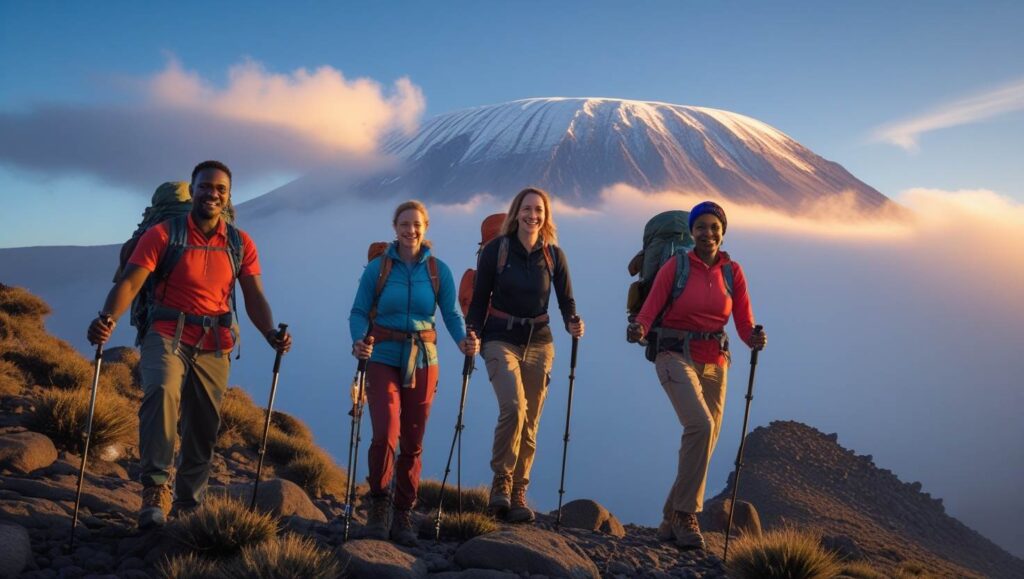Climbing Mount Kilimanjaro is a dream for many adventurers, but it comes with significant costs. The total expense varies depending on factors such as the chosen route, the expedition length, the quality of the tour operator, and additional expenses like gear, tips, and visas. So, how much does it cost to climb Kilimanjaro? The cost ranges from $2,500 to $7,000, depending on the package and service level.
What You Must Know Before Climbing Kilimanjaro
- Climbing Kilimanjaro costs between $2,500 and $7,000, depending on the tour operator, route, and service level.
- The chosen route and number of trekking days impact costs. Shorter routes like Marangu cost $1,700 – $2,800, while longer ones like the Northern Circuit can reach $5,500.
- Additional expenses include flights, accommodation, gear, and tipping. Flights range from $800 to $1,500, while accommodation costs between $50 and $200 per night.
- Essential gear and equipment can cost between $500 and $1,500 if purchased new or $10 to $50 per item when rented.
- Tipping is customary, with guides, porters, and cooks expecting between $5 and $20 per day.
How Much Does It Cost to Climb Kilimanjaro?
Mount Kilimanjaro, located in Tanzania near Kenya’s border, stands at 5,895 meters. It’s about 140 miles from Nairobi and 100 miles from the East African Rift, with Moshi as the nearest town. Understanding the costs involved helps potential climbers plan their budget effectively.
Below is a breakdown of all the expenses involved in climbing Kilimanjaro.
1. Tour Operator Costs
A licensed tour operator is required for all Kilimanjaro climbs. Prices vary based on service quality:
- Budget Operators: $1,500 – $2,500 (Basic services, fewer safety measures)
- Mid-Range Operators: $2,500 – $4,000 (Balanced cost and quality)
- Luxury Operators: $4,000 – $7,000 (Private tents, gourmet meals, highly experienced guides)
Read also 12 solo travel tips for your first international trip
2. Transport & Fuel Costs
The route and expedition duration affect transportation costs, including airport transfers and travel to the park. Fuel prices in Tanzania are high, impacting expenses.
Common routes and their costs:
- Marangu Route (5-6 days): $1,700 – $2,800
- Machame Route (6-7 days): $2,000 – $3,500
- Lemosho Route (7-8 days): $2,500 – $4,000
- Rongai Route (6-7 days): $2,200 – $3,800
- Northern Circuit (9 days): $3,500 – $5,500
3. Essential Gear & Equipment Costs
Climbers need proper gear to handle Kilimanjaro’s five climatic zones. Buying new gear can cost $500 to $1,500, while renting in Tanzania costs $10 to $50 per item. Recommended Gear List:
- Insulated winter jacket
- Waterproof trekking pants
- High-quality hiking boots
- Sleeping bag
- Daypack
- Trekking poles
- Water purification tablets
4. Flights to Kilimanjaro
Flights to Kilimanjaro International Airport vary based on departure location:
- From the U.S. or Europe: $800 – $1,500 round trip
- From Africa: $166 – $750
5. Accommodation Costs Before & After the Trek
Most climbers stay in Moshi or Arusha before and after the trek:
- Budget hotels: $50 – $80 per night
- Mid-range hotels: $100 – $120 per night
- Luxury lodges: $200+ per night
6. Tipping Costs for Kilimanjaro Climbers
Tipping is customary, and recommended amounts per climber are:
- Guides: $20 per day
- Assistant guides: $15 per day
- Cooks: $10 per day
- Porters: $5 – $8 per day
A full climbing crew of 8-12 members means tips typically range from $200 to $300 per climber.
7. Permits & Park Fees at Kilimanjaro
A Kilimanjaro trekking permit costs around $1,000 per person for a standard 7-day trek. This fee includes:
- Park entry
- Camping fees
- Rescue fees
- Crew wages
Read: 7 Things to pack when travelling to London
8. Visa & Travel Insurance Costs
- Tanzania Visa: $50 (most nationalities) / $100 (U.S. citizens)
- Travel Insurance: $50 – $300 (depends on coverage)
Get visa assistance if you are travelling to Tanzania from Nigeria.
How expensive is it to climb Kilimanjaro?
Climbing Kilimanjaro costs between $2,500 and $7,000, depending on the route and services.
Why is Kilimanjaro expensive?
The cost includes high government park fees, necessary gear, guide wages, and logistics.
How long does it take to climb Kilimanjaro?
The shortest route takes five days, but six to eight days improves summit success.
Where do climbers sleep on Kilimanjaro?
Most routes require tent camping, except for Marangu, which has mountain huts.

